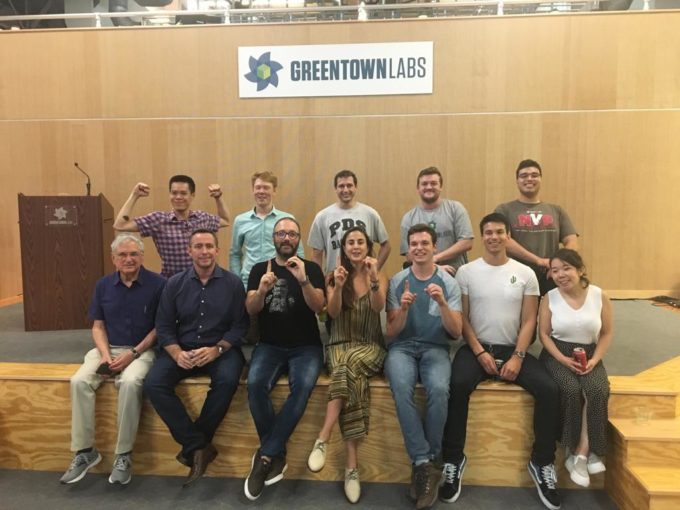Batteries are integral to clean energy. From wind and solar storage to electric vehicles, we need to rely on batteries more than ever as we reorient society toward sustainability.
But there’s a problem: it’s difficult to tell how much life batteries have left, so they’re retired prematurely. We forfeit their full potential and produce them in excess.
Titan Advanced Energy Solutions solves this problem by borrowing principles from astrophysics to create a battery management system that is faster, more accurate, and less expensive than the current standard.
“We can do in a second what it takes current systems 18 to 20 hours to do, and the cost of our equipment is 100 times less,” explains Sean O’Day, Co-founder, President, and CCO of Titan. “It’s a real step change in the way you can test new and used batteries.”
Before co-founding Titan, Shawn Murphy (who serves as both the company’s CEO and CTO) worked as the head of Space Science and Technology of Draper Laboratory and the director of Shell’s Advanced Engineering Center Shell TechWorks. He drew on those experiences to tackle battery management system challenges.
Murphy’s solution uses ultrasound technology to accurately measure lithium-ion batteries. This approach measures both the state of charge (think the battery percentage on your phone) and the state of health (think of where your phone battery is in its overall lifespan). The ability to precisely measure these two metrics has striking impacts: up to 20 percent increase in state of charge (capacity) and up to a 125 percent increase in state of health (life cycles).
“It’s a very different approach—we’re observing it at the molecular level as opposed to taking measurements and estimating,” O’Day says. “Think of it as a real-time CAT scan of the battery, versus a blood test that you get from your doctor once a year.”
Once Murphy ran the fundamental equations to prove his approach was feasible, he brought his idea to O’Day. Titan took off quickly from there.
“We spoke for a long time,” Murphy recalls. “It started somewhere around 10:00 in the morning and ended in a sushi restaurant in Marblehead that night. We came up with the name of the company, we came up with the general premise of the company, we shook on the division of the company. Everything happened from 10:00 in the morning to 9:00 in the evening—so in 11 hours, everything was struck.”
Titan’s technology has a broad range of applications, most notably electric vehicles, energy storage, and second life batteries.
Batteries are considered depleted from electric vehicles when they’re at just 70 percent state of health, O’Day and Murphy explain, which leaves plenty of power potential for other uses. Titan’s technology can accurately test the batteries’ state of health and earmark them for reuse. The company is piloting its approach with leading car manufacturers.
Using batteries to their full potential means that we can produce—and dispose of—fewer batteries. This reduction, according to Titan’s research, could lead to a decrease of carbon dioxide emissions and other greenhouse gases by 2,765,000 metric tons annually starting in 2020 and 37,327,500 metric tons annually beginning in 2030.
“You see a lot of articles about, ‘What are we going to do with all these batteries coming out of all these cars?’” O’Day notes. “Our piece of the value stream is, before you send it to a final recycling process, when it comes out of its first life, to cost-effectively enable it to be repurposed—to fully utilize that battery.”
Whereas typically measuring batteries requires extensive training, Titan’s battery management system is simple and safe to use. It can also detect internal gas formation very early on, which means more battery fires can be prevented.
Titan joined Greentown Labs in May 2018, but that wasn’t Murphy’s first time working out of the cleantech incubator. As director of Shell’s innovation center, Murphy was an anchor tenant when Greentown first moved to its Somerville location in 2013.
“When we decided we needed a lab space, we said, ‘We need to come to Greentown,’” O’Day says. “It’s just an obvious ecosystem that makes sense for us to be a part of—we’re right in the heart of cleantech development in this part of the country. All of the support, all of the visibility that we’ve been given to potential investors or corporate partners is, I think, unmatched to any other type of place we could’ve resided for the last 15 months.”
Greentown Labs is a community of bold, passionate entrepreneurs creating solutions for today’s biggest climate and environmental challenges. Located in Somerville, Mass., the Greentown Labs Global Center for Cleantech Innovation is the largest cleantech incubator in North America, operating a 100,000 sq. ft. campus comprised of prototyping and wet lab space, shared office space, a machine shop, electronics lab, and a curated suite of programs and resources. Greentown Labs is home to more than 90 startups and has supported more than 210 since its inception.


